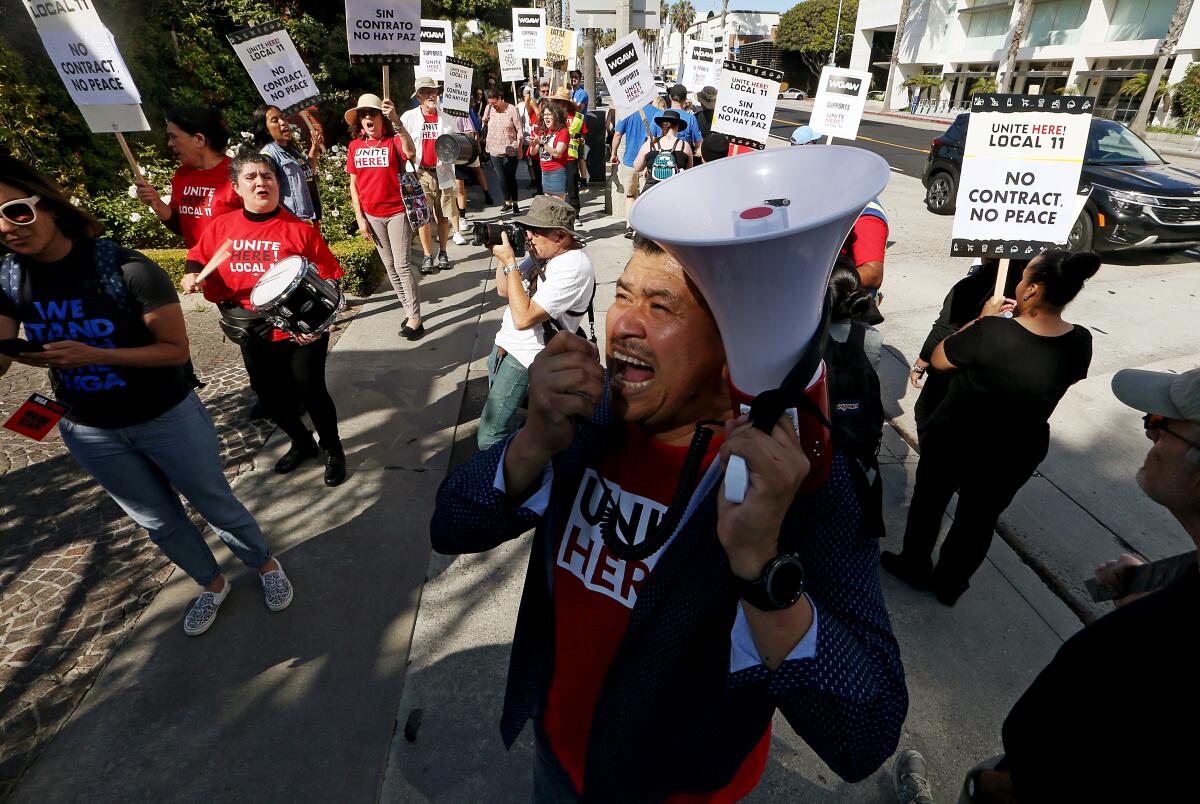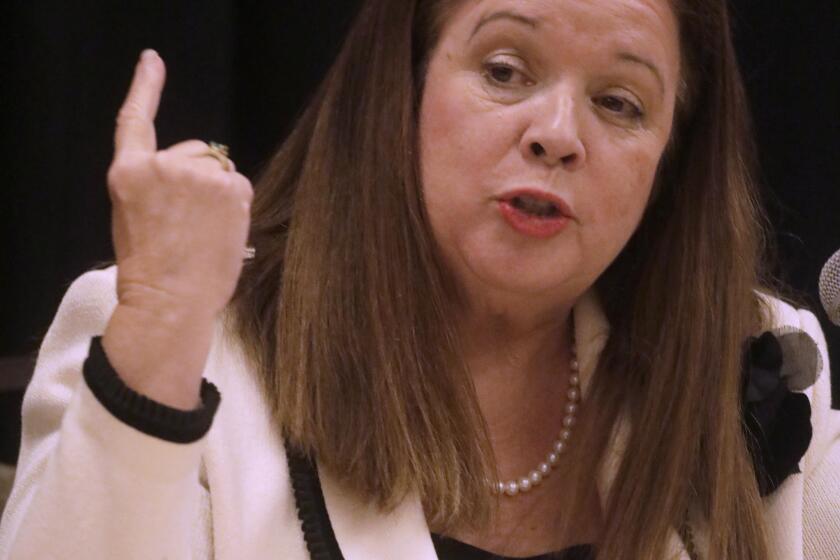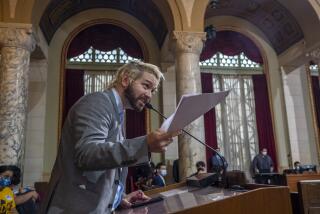L.A. politicians are joining picket lines. The city attorney wants them to stay away

In the middle of L.A.’s hot labor summer, City Atty. Hydee Feldstein Soto has advised city officials to refrain from speaking out at strikes or union protests.
- Share via
Los Angeles City Councilmembers Hugo Soto-Martínez and Nithya Raman sat cross-legged in the middle of Century Boulevard last month, helping to block cars from reaching Los Angeles International Airport in a show of solidarity with the region’s hotel workers.
That demonstration — and the subsequent arrest of Soto-Martínez, Raman and nearly 200 others — generated headlines for obvious reasons. Zip ties and police processing aside, the presence of the two council members was hardly surprising.
In recent months, an array of federal, state and local politicians — including several members of the City Council — have walked picket lines or offered support not just to Unite Here Local 11, the hotel workers union, but also TV and film writers marching outside studios and school workers demonstrating outside Los Angeles Unified campuses.
Yet in recent weeks, lawyers with Los Angeles City Atty. Hydee Feldstein Soto’s office have begun quietly advising the city’s elected officials to refrain from getting involved in labor disputes, saying such activities could result in legal action against the city.
In a confidential July 3 memo, a copy of which was reviewed by The Times, Feldstein Soto’s team warned elected leaders that if they show up on picket lines or rally with demonstrators, they might have to recuse themselves from voting on a related issue in the future.
“Participation in such activities by multiple members may affect council’s ability to meet quorum on matters involving the union or the employers and could expose the city to liability,” the memo said.
Months before City Atty. Hydee Feldstein Soto recommended Mark Adams for the equivalent of an open-ended, no-bid contract to oversee 1,500 Skid Row tenants, Adams hosted a fundraiser for her campaign.
That advice threatens to throw a wet blanket on L.A.’s hot labor summer, which has seen a series of walkouts and labor actions in the hospitality and entertainment industries. The memo also runs counter to decades of pro-union activism in Los Angeles, a deep-blue city where organized labor and municipal politics are inextricably entwined.
L.A.’s politicians have voiced their support over the years for teachers, janitors, longshore workers and a wide range of other unionized professions. Councilmember Kevin de León, asked about the memo last week, said he has no intention of abdicating his right to free speech and to assemble.
De León, who ran for mayor last year with more than $430,000 in support from Unite Here Local 11, said he plans to remain outspoken about workers’ demands for fair wages, including when they are on strike.
“Legal opinions do not extinguish the constitutional rights of elected officials who use their voices to champion the struggles of hotel workers or Hollywood writers in their fight for dignity and respect,” he said in a statement.
Kurt Petersen, co-president of Unite Here Local 11, had an even stronger reaction, saying the memo is “based on an extreme and unsupported mischaracterization of federal labor law.”
“There is nothing inappropriate about city officials exercising their individual constitutional free speech rights to join or express support for workers on the picket lines,” he said in a statement.
Soto-Martínez, a former organizer with Unite Here, offered a more diplomatic assessment, saying he appreciates the city attorney’s advice and will use it to “weigh the pros and cons” of any action he takes in the future.
“I have showed up for working Angelenos my entire life, that’s why I was elected. I will do what I can to ensure they are treated fairly,” he said in a statement. “If an issue arises where there may be a potential recusal, I will consult with the city attorney and move forward from there.”
A spokeswoman for Raman said her boss was not available to discuss the memo.
Neither Feldstein Soto nor her spokesperson responded to requests for comment from The Times.
In the memo, the city attorney’s legal team said it provided its advice in response to inquiries from elected officials about picketing in support of Unite Here. The lawyers acknowledged that those officials, in their capacity as individuals, still retain their “constitutional rights of speech and assembly and are free to exercise those rights in peaceful union protests.”
The lawyers suggested that council members who appear at protests over contract disputes make clear that they are speaking in their own capacity, not as elected officials, to avoid raising concerns about “bias and impartiality.” They also suggested that city elected officials who appear on picket lines do so as a legal observer, not a participant, and avoid wearing clothing with the city seal.
Lawyers for Feldstein Soto said much of their concern is based on a federal law barring the city from using “economic pressure or regulatory powers” to interfere in union disputes. They cite Golden State Transit Corp. vs. City of Los Angeles, a sprawling case that twice reached the U.S. Supreme Court, which stemmed from actions taken by the council during a labor dispute more than 40 years ago.
The saga began in 1981, when the council intervened on behalf of a Teamsters chapter on strike against Yellow Cab Co., then the city’s largest taxi company. At the behest of the Teamsters, the city voted to block the renewal of Yellow Cab’s franchise because of the dispute.
The taxi company subsequently went out of business, and Golden State Transit Corp., Yellow Cab’s parent company, sued the city.
The Supreme Court found in the company’s favor twice, concluding that the city had improperly interfered in a labor dispute, and later ruling that the city was liable for damages.
The Golden State Transit decisions are seminal holdings in labor law, and the case cost the city millions. Still, several legal experts said they do not believe it has a bearing on the types of activities that were assessed by Feldstein Soto.
William B. Gould IV, a professor emeritus at Stanford Law School, said he doesn’t see any reason the city’s elected officials should be discouraged from joining picket lines during a labor dispute. The Golden State Transit precedent centered on a “decision by government, not an expression of view,” said Gould, a former chairman of the National Labor Relations Board.
Get the lowdown on L.A. politics
Sign up for our L.A. City Hall newsletter to get weekly insights, scoops and analysis.
You may occasionally receive promotional content from the Los Angeles Times.
UC Berkeley School of Law Dean Erwin Chemerinsky also drew a stark separation between the council’s 1981 vote to block Yellow Cab’s franchise renewal and demonstrations of support for hotel workers or Hollywood screenwriters.
“There is a huge difference between the city, as an entity, taking the coercive action of not renewing a contract, and individual city officials expressing their views,” he said in an email.
Former Los Angeles City Atty. Carmen Trutanich said he did not provide such guidance while in office between 2009 and 2013.
“Absent someone doing something stupid on the picket lines, I can’t see a problem with it,” he said. “But everyone defines stupid differently.”
The memo from Feldstein Soto offered another reason for city leaders to refrain from participating in Unite Here protests: The city has a contract with a union hotel — the L.A. Grand in downtown Los Angeles, which is being used as temporary homeless housing at a cost of nearly $4,700 per room per month.
The L.A. Grand could claim that picketing with workers from the Unite Here Local 11 is evidence of bias against the hotel or “undue interference with the hotel’s contractual rights,” the memo said.
Catherine Fisk, faculty director of the Berkeley Center for Law and Work, said she had not heard of a situation in which a government lawyer has told elected officials to avoid speaking out on a high-profile labor dispute.
Still, Fisk said it is not irrational for the city’s lawyer to write a letter describing the litigation risk posed by the Golden State Transit case.
“To be fair, attorneys for organizations — and the city attorney is an attorney for an organization — their job is to worry about possible risks of liability to the organization,” she said.
More to Read
Sign up for Essential California
The most important California stories and recommendations in your inbox every morning.
You may occasionally receive promotional content from the Los Angeles Times.













